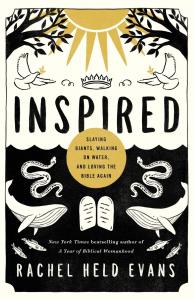What Are You Looking For?
Like Dave Armstrong, Rachel Held Evans converted from a fundamentalist, sola scriptura faith tradition to a liturgical church employing the sacrament of Confirmation as the measure of full membership. Neither of them are ordained or have formal academic credentials in theology or Biblical scholarship, but both pursued the subject vigorously with years of self-study. The resemblance stops there. Evans was in diapers when Armstrong was compiling his summa of proof-texts. She entered the Episcopalian Church just a few years ago to find communion with believers who were committed to serving the poor and marginalized in Jesus’s name, and who welcomed her penchant for endlessly grappling with questions about faith; he entered the Roman Catholic Church in 1991, seemingly to claim an ownership share in the Church’s possession of Truth and Magisterial authority to define heresy and excommunicate.

Though Evans spent her entire too-short adult life (she died at age 37) wrestling with questions about what the Bible reveals about God and how it guides our lives, she would not be surprised at all to hear Armstrong say “I have always found it to be clear on any given topic I explored.” As she observes:
We all go to the text looking for something, and we all have a tendency to find it….
If you are looking for Bible verses with which to support slavery, you will find them. If you are looking for verses with which to abolish slavery, you will find them. If you are looking for verses with which to oppress women, you will find them. If you are looking for verses with which to honor and celebrate women, you will find them. If you are looking for reasons to wage war, there are plenty. If you are looking for reasons to promote peace, there are plenty more. If you are looking for an outdated and irrelevant ancient text, that’s exactly what you will see. If you are looking for truth, that’s exactly what you will find.
This is why there are times when the most instructive question to bring to the text is not, What does this say? but, What am I looking for? I suspect Jesus knew this when he said, “Ask and it will be given to you; seek and you will find; knock and the door will be opened to you” (Matthew 7: 7).
My impression from reading this book, as well as her penultimate book, Searching for Sunday, is that Evans went looking for wisdom, and that is what she found.
Evans was not a relativist or deconstructionist, as some might suppose. She notes that “the fact that a single biblical text can mean many things doesn’t mean it can mean anything.” She calls out the invalidity of interpretations justifying slavery, genocide, and overlooking sexual assault by political leaders. “Anytime the Bible is used to justify the oppression and exploitation of others, we have strayed far from the God who brought the people of Israel out of Egypt, ‘out of the land of slavery.’”
But being Episcopalian, Evans doesn’t have any authority to point to who can rule such oppressive interpretations out of bounds. She suggests reading the Bible “alongside people from marginalized communities, past and present, who are often more practiced at tracing that crimson thread of justice through its pages,” and “centering their stories.” As salutary as such a practice would be, this is where I find Evans least satisfying. Oppressive voices drown out the stories of the oppressed, by definition. To command the attention and consciences of the comfortable and lukewarm masses of Christians in the pews, there must be a higher authority to lift up the stories of the lowly and cast down the distorted claims of the mighty.
How Can We Engage with the Bible’s Active Inspiration?
The main focus of Inspired is not adjudicating conflicting interpretations of the Bible, however. Rather, it is to encourage the reader to approach the Bible as an inspiring text. As she explains at the end of her introduction,
God is still breathing. The Bible is both inspired and inspiring. Our job is to ready the sails and gather the embers, to discuss and debate, and like the biblical character Jacob, to wrestle with the mystery until God gives us a blessing. If you’re curious, you will never leave the text without learning something new. If you’re persistent, you just might leave inspired.
Evans’ own method of engagement with the Bible is strongly influenced by “midrash—those imaginative explorations and expansions of Scripture that serve as the most common form of biblical interpretation in Jewish traditions.” Her suggestion to read the Bible in a sufficiently-diverse community to avoid oppressive interpretations seems to arise from this method as well. She explains in the first chapter:
“The Bible creates community,” wrote Timothy Beal in The Rise and Fall of the Bible, “by providing space for community to happen. It offers storied worlds and theological vocabularies around which people can come together in conversation about abiding questions. It calls for creative, collaborative participation.”
This attitude stands in stark contrast to the winner-take-all posture in many fundamentalist Christian communities, which positions the solitary reader as objective arbiter of truth, his “straightforward” reading of the text final and exclusive. The refrain goes something like, “The Bible said it; I believe it; that settles it,” which is not exactly the sort of conversation starter that brings people together.
Midrash, with its imaginative engagement of the Bible’s stories, reminds us that biblical interpretation need not be reduced to a zero-sum game, but rather inspires endless insights and challenges, the way a good story does each time it is told and retold. Our relational God has given us a relational sacred text, one that, should we surrender to it, reminds us that being people of faith isn’t as much about being right as it is about being part of a community in restored and restorative relationship with God. This is how Paul engaged Scripture, after all, and Jesus—both of whom were Jews.
What ensues are eight chapters exploring eight different literary genres in the Bible, each one beginning with Evans retelling a familiar Bible story in a new setting, drawing out or imagining new details that breathe brilliant new color into familiar texts. She traces thematic elements such as community, justice, struggle, lament, deliverance, miracles, and faith. Her imaginative storytelling and lyrical prose pull the reader quickly through the book. I indeed found myself inspired, often tearing up while listening to the audiobook, hearing these stirring words in her chipper Tennessee accent, spoken from beyond the grave.
How Do We Handle the Bible’s “Difficulties”?
There’s nothing controversial about highlighting themes or imagining oneself as an actor in a biblical text (Catholics are routinely encouraged to do that when meditating on the mysteries of the rosary, for instance). But what about those “difficulties” that Dave Armstrong was addressing? Indeed, both Armstrong and Evans name the same book, Gleason Archer’s Encyclopedia of Bible Difficulties. Armstrong seems to be defending the book, while Evans calls it “less than helpful.”
Ultimately, Evans is able to get comfortable with the “difficulties” of the Bible by adopting a definition of “inspired” that accounts for the weaknesses of the human authors. She shies away from the term “infallible” and focuses on fidelity in cooperating with the Spirit within the context of messy, limited, enfleshed humanity. She dialogues with the Biblical text as author to author.
Inspiration is better than magic, for as any artist will tell you, true inspiration comes not to the lucky or the charmed but to the faithful—to the writer who shows up at her keyboard each morning, even when she’s far too tired, to the guitarist whose fingers bleed after hours of practice, to the dancer who must first learn the traditional steps before she can freestyle with integrity. Inspiration is not about some disembodied ethereal voice dictating words or notes to a catatonic host. It’s a collaborative process, a holy give-and-take, a partnership between Creator and creator.
While Christians believe the Bible to be uniquely revelatory and authoritative to the faith, we have no reason to think its many authors were exempt from the mistakes, edits, rewrites, and dry spells of everyday creative work.











